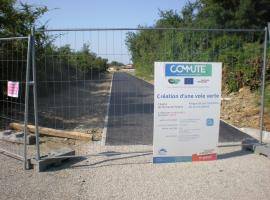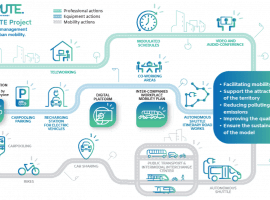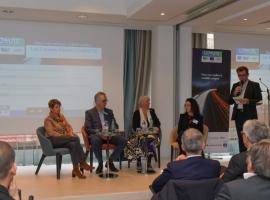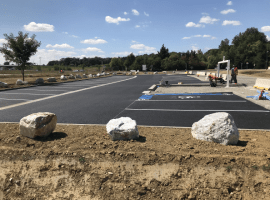This sixth Journal identifies three key aspects of COMMUTE that are particularly relevant following the end of the project and beyond:
- COMMUTE final evaluation
- COMMUTE reference framework
- COMMUTE legacy
1. COMMUTE final evaluation
The COMMUTE evaluation has been carried out in three stages:
- Mid-term evaluation: Summer 2019
- Final evaluation: 31 January 2021
- Final qualitative report: 31 January 2022
The final evaluation is both quantitative (KPIs) and qualitative (mobility surveys).
COMMUTE’s final qualitative report is still ongoing. Toulouse Métropole, as the urban authority, has been in charge of the monitoring and evaluation of the project. It subcontracted this task to the Urban planning agency of the Toulouse Metropolitan region (AUAT - Agence d'Urbanisme de l'Agglomération Toulousaine), which will highlight the following aspects of the project: the operational challenges encountered during the implementation phase, the main results achieved during the year since the official end of the UIA projects, and the long-term sustainability and scalability of your UIA project. It will also provide the overall impressions of the project leader on the levels of innovation, the involvement of local stakeholders and measurability, and the overall added value that UIA has brought to your city.
It is to be noted that this final evaluation has also been the opportunity to update the project Key Performance Indicators (KPIs) of COMMUTE, with a new survey circulated to the COMMUTE company employees at the end of 2021. This update of KPIs is being led by the AUAT. Both the KPIs update and the final evaluation report will be available by 31 January 2022.

First results from the final evaluation point out the difficulties encountered by COMMUTE due to the COVID-19 pandemic. It highlights that several lockdowns and a period of short-time work affected particularly the employees of the COMMUTE area and had a major impact on the use of public transport and car-pooling (social distancing recommendations).
2) COMMUTE reference framework
The implementation of the COMMUTE collaborative governance has led to a reference framework[1], which should eventually lead to a European ISO standard for mobility management in the years to come.
One of the main goals of the COMMUTE project focused on transferability. COMMUTE partners and the Work Package leader for the reference framework, namely Airbus, have cooperated with AFNOR, the French standardisation agency, and developed a reference framework on collaborative governance of urban mobility. This framework ensures that the project’s learnings can be transferred and replicated now that COMMUTE has come to an end. Regular partner meetings enabled the analysis of externalities and added value generated by that new governance system, which fed into the development of the reference framework.
The reference framework was the last action of COMMUTE to be concluded. It will serve as a basis for a future ISO standard for mobility management systems. Legal requirements linked to intellectual property rights prevented the development of a standard so far. All COMMUTE deliverables had to be made public, which makes the development of a standard impossible, since it is expected to belong to the standardisation committee. AFNOR decided to apply a process that is similar to a standard, so this reference framework follows the ISO model for mobility management systems. As COMMUTE partners wish so, this reference framework might become a European or international standard in the future. Project partners will have to commit to the development of the standard and fulfil all legal requirements. It is to be noted that several French mobility stakeholders wish to develop sustainable mobility standards: discussions are ongoing regarding a set of ISO standards on sustainable mobility.
Within the development of the reference framework, a normative mapping has been carried out for the project’s pilots, led by Tisseo. The aim was to identify existing reference frameworks and feed into the decision on the COMMUTE framework and the pilots’ deployment. It also contributed to provide references in order to avoid “reinventing the wheel”. For instance, it helped to understand the standards and norms for electric vehicles’ charging (charging points at COMMUTE carpooling hub). Norm ISO 37101 on management systems for sustainable development within territorial communities also inspired the COMMUTE reference framework.
3) COMMUTE legacy
Many of the COMMUTE actions are being continued. These actions have been mostly taken over by Tisséo Collectivités. This is for instance the case of the cycling services, set up by Tisséo Collectivités during the COMMUTE project, and which Tisséo Collectivités has committed to further support, also financially, until 31 December 2022 at least. A public procurement procedure allocated the provision of the service to « Maison du Vélo ».
Regarding infrastructure and equipment, car parks at Toulouse Blagnac airport (8 places) and Pibrac (25 places) will remain, as well as the electric charging facilities (2 charging places in Pibrac) and carpooling spots (8 drop off/pick up spots located nearby a public transport station and cycling lanes). KAROS, the carpooling service provider, will continue to be active until 31 December 2021. The carpooling app will then continue beyond 2021 (more details to be provided soon).
The COMMUTE Inter-Company Workplace Travel Plan (PMIE) also continues. During the COMMUTE project, and under the leadership of Tisséo Collectivités and the Réussir Business Club, five COMMUTE partner companies (Airbus, ATR, Toulouse Blagnac Sopra Steria Airport and Safran) designed and implemented a common and shared mobility plan approach which resulted in on a concrete action plan[2].

All the partner companies of COMMUTE also continue to raise awareness about the need to shift away from individual car use in the aeronautical area. The COMMUTE spirit is deeply rooted in the partner companies. The promotion of cycling as an alternative to the car has been particularly successful during the project and continues to be. It is thanks to COMMUTE that companies in the aeronautical zone have realized the interest from employees for cycling solutions. Cycling actions will continue, with companies actively supporting this important focus of the project.

The COMMUTE digital platform, led by Sopra Steria during the project as project partner, continues with Sopra Steria now as a subcontractor to Tisséo Collectivités. For the digital platform to continue with Sopra Steria as lead, the city organized an “experimental procurement” procedure based on technical specificities acquired by Sopra Steria throughout the project. This unique procurement process allows for the continuation of the digital platform for another year. The scope of the digital platform has also been extended, with Tisséo Collectivités contacting the Toulouse University Hospital and military headquarters to be part of the platform. This should happen early 2022.
The COMMUTE Local Urban Mobility Committee (CLMU), which had been created by COMMUTE and brought together the nine partners as well as the stakeholders of the public and private airport area - whose membership was formalised by the signing of the "COMMUTE Charter" – will continue, but in a different form. Three Local Committee meetings were held (2 in 2019 and 1 in 2020) to co-build with stakeholders a common vision of urban mobility at the level of the airport area, through the establishment of collaborative workshops on carpooling, cycling and walking. The other key objective was to participate in the development of a master plan for mobility in the area. The CLMU has been replaced by the “Partners’ Committee” (“Comité des partenaires”), which is a new requirement from the French national Mobility Law (Loi d’Orientation des Mobilités – LOM). COMMUTE is considered as a pioneer in the matter, inspiring a Rapporteur of the LOM to set up such a “Partners’ Committees” where relevant. COMMUTE has indeed be a precursor of the LOM, which sets collaborative management principles, which have already implemented by COMMUTE over the past years.
In terms of replication, Toulouse Blagnac Airport and Sopra Steria (partners in the COMMUTE project) are part of the Horizon 2020 project "Stargate" - LC-GD-5-1-2020 - "Green airports and ports as multimodal hubs for sustainable and smart mobility" (European Green deal call), which has just been approved by the European Commission (2021-2026). This project is the response of a consortium of 22 entities led by Brussels Airport committing to create green airports as multimodal hubs for sustainable and smart mobility. One of the pillars of the project was strongly inspired by the collaborative governance model of the COMMUTE project, including a focus on multimodal, sustainable and smart mobility through an innovative mobility governance practice aiming at creating an intermodal hub, and dedicated tools to enhance the digitalisation and decarbonisation of passenger and freight transport.
In addition, at national level, COMMUTE inspired two other winning projects:
- VILAGIL: A project winner in 2019 of the national call for projects "Territories of innovation" to decongest and decarbonise the urban area, in partnership with other peri-urban and rural intercommunities.
As mentioned in Journal 5, VILAGIL addresses several targets (electromobility, third places, development, urban air mobility, logistics, data valuation, MaaS, civic engagement, etc.) and brings together around twenty public and private partners, who co-invest to carry the program, with financial support from the State via the Banque des Territoires (Caisse des Dépôts). Currently being launched, it will support Francazal's development over the next few years. It is part of the continuity of a partnership dynamic already well underway in the region, around several emblematic partnership projects.
- ECO_MODE : Winner of the State / ADEME "Energy Savings Certificates" (CEE) call for programmes, ECO_MODE is a public-private collaborative program led by Toulouse Métropole. This programme follows in particular the European project COMMUTE and the 3 partners of Toulouse Métropole are Tisséo Collectivités, Airbus and Sopra Steria. ECO_MODE aims to decarbonise mobility by acting on individual behavior and travel choices, while promoting and rewarding mobility that consumes little fossil energy (carpooling, cycling, metro, tram, micro-mobility, teleworking and third parties). places of companies ...), as an alternative to the use of the private car (autosolism). The objective of the programme is to avoid 72,000 daily trips by private car in the Toulouse metropolitan area by 2022 (18,175 tonnes of C02 and 7 million liters of fuel), i.e. a decrease of 2 points in the modal share of the individual car. The ECO_MODE device will constitute an important base for the deployment of MaaS in Toulouse.



















